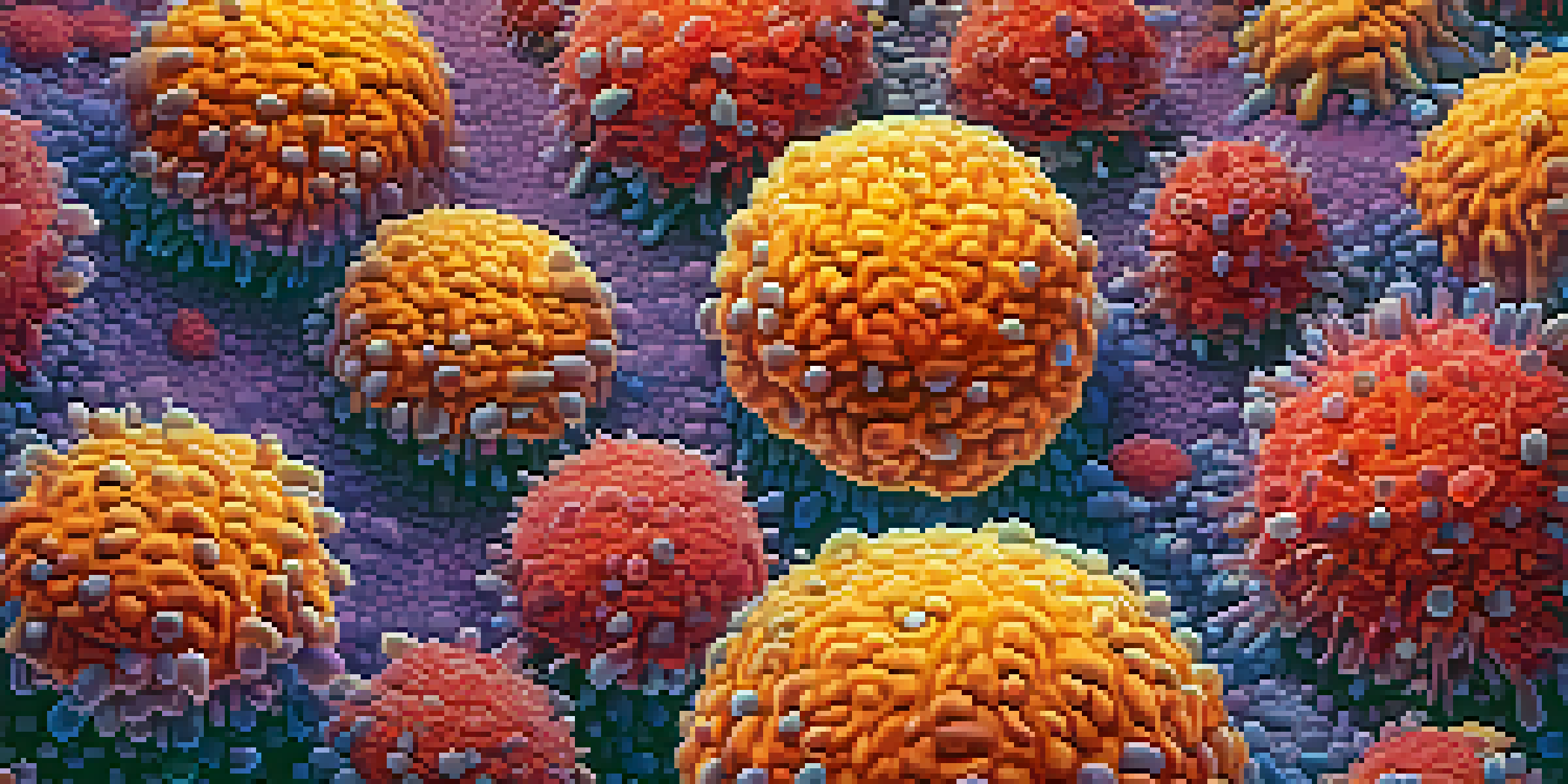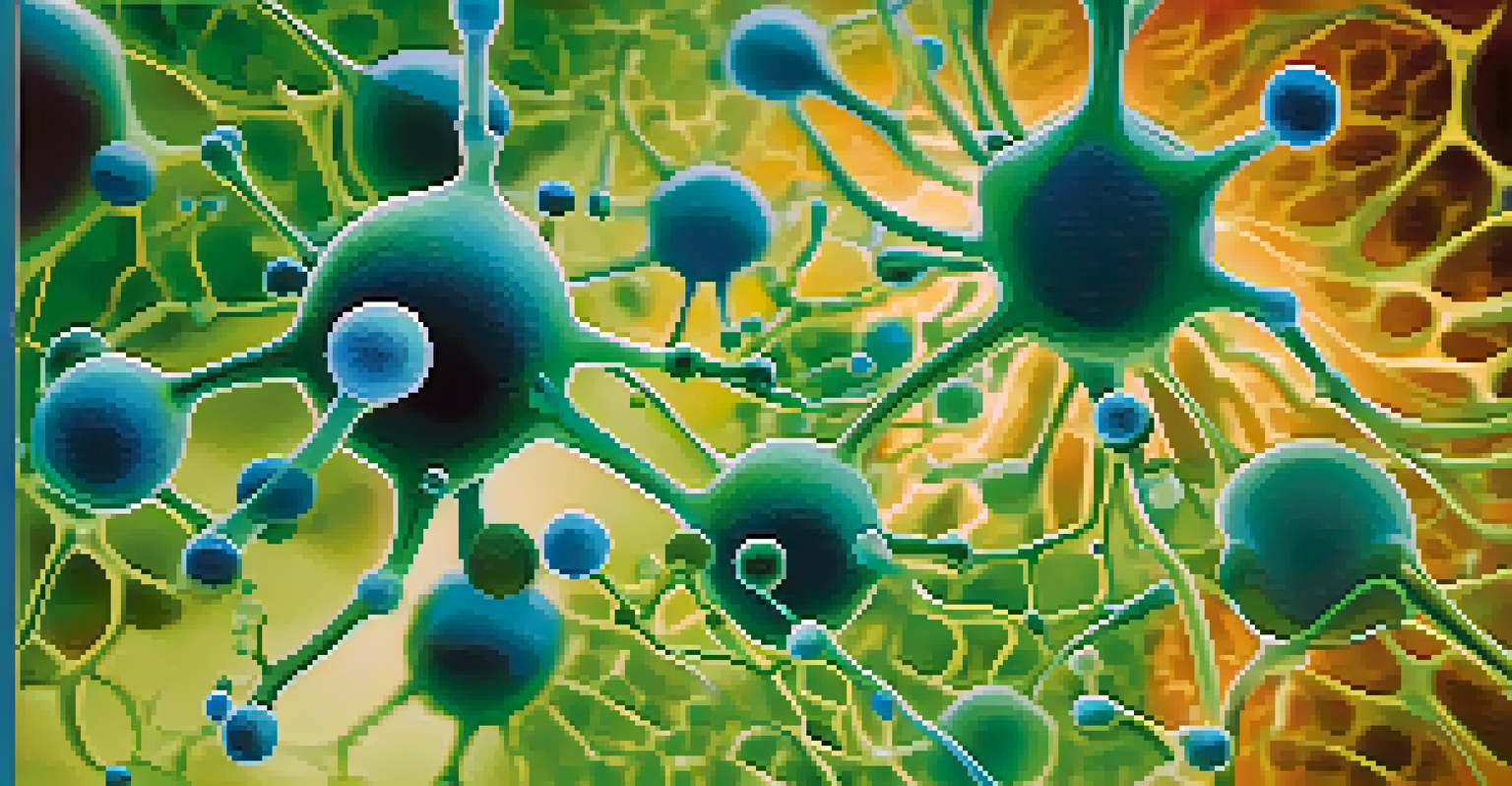The Importance of Innate Immunity in Disease Prevention

What is Innate Immunity and Why Does It Matter?
Innate immunity is the body's first line of defense against pathogens. Unlike acquired immunity, which develops over time, innate immunity is present from birth. It acts quickly to identify and eliminate invaders, providing crucial protection during the early stages of infection.
The immune system is a complex network of cells and proteins that defends the body against infection.
This system includes physical barriers like the skin and mucous membranes, as well as immune cells that respond rapidly to threats. Think of it as the body's immediate response team, ready to tackle any intruder that comes its way. Without this defense, our bodies would be vulnerable to countless diseases.
Moreover, innate immunity plays a key role in shaping the adaptive immune response, which learns and remembers specific pathogens. This interaction ensures that our bodies can respond more effectively to future infections, underscoring the importance of innate immunity in long-term health.
Components of Innate Immunity: A Closer Look
The innate immune system comprises various components, including physical barriers, immune cells, and chemical signals. Physical barriers like skin and secretions act as a shield, while immune cells such as macrophages and neutrophils patrol the body for signs of trouble. These cells are like vigilant guards, ready to spring into action when needed.

Additionally, proteins called cytokines are released to signal and coordinate the immune response. They help amplify the body's defense mechanisms and communicate with other immune cells. This complex interplay ensures a swift response to infections, preventing pathogens from establishing themselves.
Innate Immunity: First Defense Line
Innate immunity is the body's immediate response system, present from birth, that identifies and eliminates pathogens quickly.
Understanding these components helps us appreciate how our body maintains health and fights disease. Each part plays a vital role, and when they work together, they create a robust defense system that is essential for disease prevention.
The Role of Innate Immunity in Fighting Infections
When pathogens invade the body, innate immunity is the first to respond, launching an attack within minutes. For instance, if bacteria enter through a cut, immune cells quickly gather at the site, engulfing and destroying these invaders. This rapid response is crucial in preventing the infection from spreading.
Innate immunity provides the first line of defense against pathogens, acting quickly to eliminate invaders.
Moreover, innate immunity helps activate the adaptive immune system, which takes longer but is more precise. By presenting information about the pathogen to the adaptive cells, innate immunity ensures that the body can remember the intruder for future encounters. This collaboration enhances our ability to fight off infections effectively.
In essence, innate immunity acts as both a frontline defense and a coordinator for the more specialized adaptive immune response. This dual role is vital, especially in the face of various pathogens that can threaten our health.
How Innate Immunity Contributes to Disease Prevention
Innate immunity not only fights infections but also plays a significant role in disease prevention. By swiftly eliminating pathogens, it reduces the chances of developing serious illnesses. For example, a strong innate immune response can prevent the onset of diseases like the flu or common cold.
Moreover, it helps regulate inflammatory responses, which are crucial in preventing chronic diseases. When inflammation goes unchecked, it can lead to conditions such as heart disease or diabetes. A well-functioning innate immune system helps maintain balance and prevents harmful inflammation from occurring.
Key Components of Immune Defense
The innate immune system includes physical barriers, immune cells, and chemical signals that work together to protect against infections.
In this way, innate immunity serves as a protective barrier, reducing the risk of both acute and chronic diseases. By understanding and supporting this system, we can enhance our overall health and resilience against various illnesses.
Factors Affecting Innate Immunity
Several factors can influence the effectiveness of our innate immune response. Nutrition, for instance, plays a critical role; a balanced diet rich in vitamins and minerals supports immune function. Think of your body as a machine that requires the right fuel to run smoothly.
Lifestyle choices also impact innate immunity. Regular exercise, adequate sleep, and stress management are essential for maintaining a robust immune system. Just like a well-tended garden flourishes, a healthy lifestyle cultivates a strong immune response.
Additionally, age and genetics can affect how our innate immunity functions. As we age, our immune response may weaken, making it crucial to adopt healthy habits to support our defenses. Understanding these factors empowers us to take proactive steps in safeguarding our health.
The Interplay Between Innate and Adaptive Immunity
Innate and adaptive immunity work hand-in-hand, creating a comprehensive defense system. While innate immunity responds quickly to immediate threats, adaptive immunity takes its time to develop a targeted response against specific pathogens. This interplay is vital for effective disease prevention.
For example, once innate immunity detects an invader, it begins to signal the adaptive immune system to prepare for a more tailored attack. This collaboration ensures that our bodies can not only fight off infections but also remember them for future encounters, enhancing our overall resilience.
Role in Disease Prevention
A strong innate immune response not only combats infections but also helps regulate inflammation, reducing the risk of chronic diseases.
This synergy between the two systems highlights the importance of a healthy innate immune response. By supporting this foundational layer of immunity, we set the stage for stronger adaptive responses, paving the way for better health outcomes.
Future Directions in Immunity Research
As our understanding of innate immunity grows, so do the possibilities for improving disease prevention strategies. Researchers are exploring ways to enhance innate immune responses through vaccines and therapies. These advancements could lead to more effective treatments for infectious diseases and even chronic conditions.
Moreover, studies are investigating the role of the microbiome in supporting innate immunity. Our gut health can significantly influence immune function, and maintaining a balanced microbiome may enhance our innate defenses. This connection opens up new avenues for promoting health.

By staying informed about the latest research and developments, we can better appreciate the importance of innate immunity in disease prevention. Embracing these advancements can empower us to take proactive steps toward a healthier future.